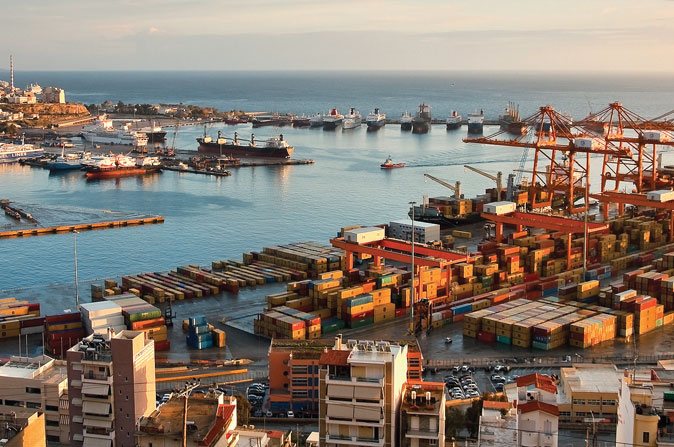Economy / Greece
Exporting its way out of the crisis
Greek companies eye foreign markets to exit crisis and turn to exports. During the first half of 2017, Greek exports rose 18%.

Piraeus port under the Chinese flag
After a nearly uninterrupted nine-year recession that has cost the country a quarter of it’s GDP, growth in Greece is back: GDP grew by 1.3% in the third quarter of 2017 compared to the third quarter of 2016, according to the Greek Statistical Authority (Elstat). This growth is mainly due to a rise in exports of goods and services, which were up 5% from the second quarter and up 7.8% y-o-y. By focusing on exports, Greek entrepreneurs made the right bet to survive the decline in domestic consumption.
“In the past months there has been a significant increase in Greek product exports (…) because Greek manufacturers have realized that it is necessary to be competitive and turn to the international market,” explained Stergios Pitsiorlas, Deputy Minister of Economy and Development, giving the example of a company manufacturing garbage trucks and successfully exporting them to Sweden. This year, 30 million tourists visited Greece during the summer season. “But a lot of the products used in hotels are imported when they should not,” said Pitsiorlas. “The government needs to make key decisions to remove existing barriers,” he added. According to the Minister, changes are needed in the legislative framework to boost exports and increase competitiveness by reducing production cost.
In 2009, exports made out 19% of GDP compared to 30% in 2016. In 2017, this upward trend continued with an 18% increase in exports. “In the last three years, we have conquered 10 new international markets,” said Elias Athanasiou, Director of Enterprise Greece, a Greek state agency that aims to promote Greek companies abroad. Enterprise Greece participates in more than 50 trade shows throughout the year and collaborates with 900 Greek companies.
Papastratos, owned by Philip Morris International, is an example of a successful Greek business. The multinational’s latest 300 million euro investment will completely transform an old factory to manufacture “HeatSticks”, a new product that contains real tobacco and can be used with an electronic cigarette. “This will create 400 new jobs, in addition to the current 800, and this is of great importance given the high unemployment rate in Greece. Moreover, as a large part of our production is exported, this will stimulate Greek exports,” explains Christos Harpantidis, CEO of Papastratos.
The Greek pharmaceutical sector is also experiencing a new era and is beginning to make itself heard abroad. Rafarm, a 45-year ophthalmology company, has tripled its exports in three years. “This year, our exports have increased by 55-60%. Rafarm exports its products to Europe, the Middle East, North Africa, Asia, Central America and more recently to Australia and Canada”, says Aris Mitsopoulos, the company’s Vice President.
